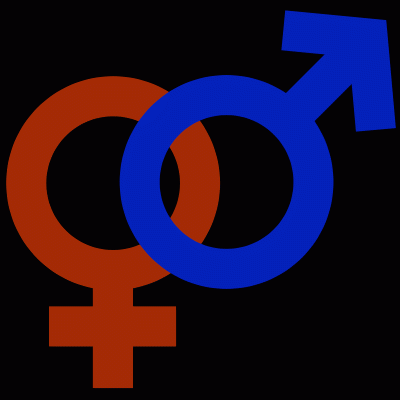| Back OpEd News | |||||||
|
Original Content at https://www.opednews.com/articles/Baylor-Women-s-Basketball-by-Angela-Hattery-130524-277.html (Note: You can view every article as one long page if you sign up as an Advocate Member, or higher). |
|||||||
May 24, 2013
Baylor Women's Basketball: Why "Don't Ask, Don't Tell" needs to be "repealed!"
By Angela Hattery
Baylor University's ban on homosexuality and the consequent "don't ask don't tell" approach to lesbians on the basketball team needs to be repealed!
::::::::
Gender Symbols by shutter stock, purchased by me
Now that the college basketball season is over, the WNBA draft has finished, the NBA draft is drawing near, as is the end of the NBA season, SportsWorld (@Professor Earl Smith) is exploding with discussions about sexuality and homosexuality in particular.
Within days of being the first overall draft pick in the WNBA, Baylor All-American Britney Griner came out publically confirming long-held speculation that she is gay. Within a few more weeks, Jason Collins revealed in Sports Illustrated through three words "I am Gay" thus becoming the first openly gay active player in a major men's sport.
The reaction to Collins was characterized as positive though many questioned the authenticity of supportive chatter in TwitterLand from current NBA stars like Kobe Bryant who was not so many years ago fined for making homophobic remarks on the court.
Griner's revelation was described by the New York Times as less exciting than a yawn; everyone has known for decades that there are lesbians in women's basketball at the college level and in the WNBA.
Over the last few days, however, controversy has erupted around Griner who is now sharing her experience as a lesbian student-athlete at Baylor. Baylor's student handbook declares that "
Controversy is focused primarily on the fact that Griner claims that Baylor head women's basketball coach Kim Mulkey knew Griner was gay when she recruited her but that she strongly demanded that Griner and others take what amounts to a "don't ask, don't tell" approach to melding their personal lives with their commitments as Baylor student athletes.
In the blog-o-sphere folks are debating Baylor's right to ban homosexuality among its students"or at least the outward expression of homosexuality. However, in the mainstream, there seems to be little discussion of the right of Baylor to deny so many students their human rights.
First and foremost, to deny any human being their right to their sexuality is simply unacceptable and should be illegal! I hope one day that sexuality and gender identity, along with all other statuses, will be protected by state and federal laws.
Second, we know from the "don't ask, don't tell" experiment that was conducted for a decade by the US Armed Forces, that this policy is personally damaging to those who must hide their identity, it actually breaks down the trust that is required to do very difficult and dangerous work, and it blocks opportunities for advancement by gay and lesbian service people.
It seems reasonable to assume that the same is true in women's basketball as it would be in any arena. If teammates can't fully trust each other then they cannot fully cooperate and their success will be limited. Sure, Baylor has won at least two national championships with lesbians playing under the "don't ask, don't tell" policy, but one wonders how many more could have been won, especially most recently in March 2013 when Baylor was eliminated fairly early on in the tournament.
What should be done?
I don't know Kim Mulkey personally nor do I know the entire situation, so I'm willing to grant her some grace and assume that her implementation of a "don't ask, don't tell" policy could have been designed to protect her players from possible expulsion by Baylor University should their sexuality be revealed.
And, certainly, Baylor University as a private institution has the legal right to have any standards they want in their student handbook. It is legal for Baylor to discriminate against people who identify as part of the LGBTQ community.
But, does the legal protection make it right?
As is the case with so many other movements for civil rights, I challenge the Big 12 Conference, other women's basketball programs, and the NCAA to step up to the plate and take a stand for the civil and human rights of all student athletes.
The Big 12 and NCAA are "member" organizations. They could require that all member institutions--including Baylor University--implement non-discrimination policies that declare sexuality and gender identity as "protected statuses." In order to compete in the Big 12 and the NCAA Baylor would have to drop the "don't ask don't tell" policy and allow all their athletes (and students, faculty and staff) to live openly regardless of their sexuality or gender identity.
Frederick Douglass said "Power concedes nothing without a challenge, it never has and it never will""
Now is the time for institutions like the Big 12, the NCAA, and the other women's basketball programs to challenge Baylor University's stance on sexuality.
Perhaps if Baylor, and Mulkey, risked losing their opportunities and accomplishments in women's basketball, they would open their arms to fully embrace heroes like Britney Griner. And, in doing so, they would welcome so many other members of their community who do not feel free to live openly to share their lives and vast experience in ways that would make Baylor better and in turn all of us better.
Authors Bio:
Associate Director of Women & Gender Studies, George Mason University, author of African American Families: Myths and Realities (2012), the Social Dynamics of Family Violence (2012), Prisoner Reentry and Social Capital (2011) and several other books and articles.
